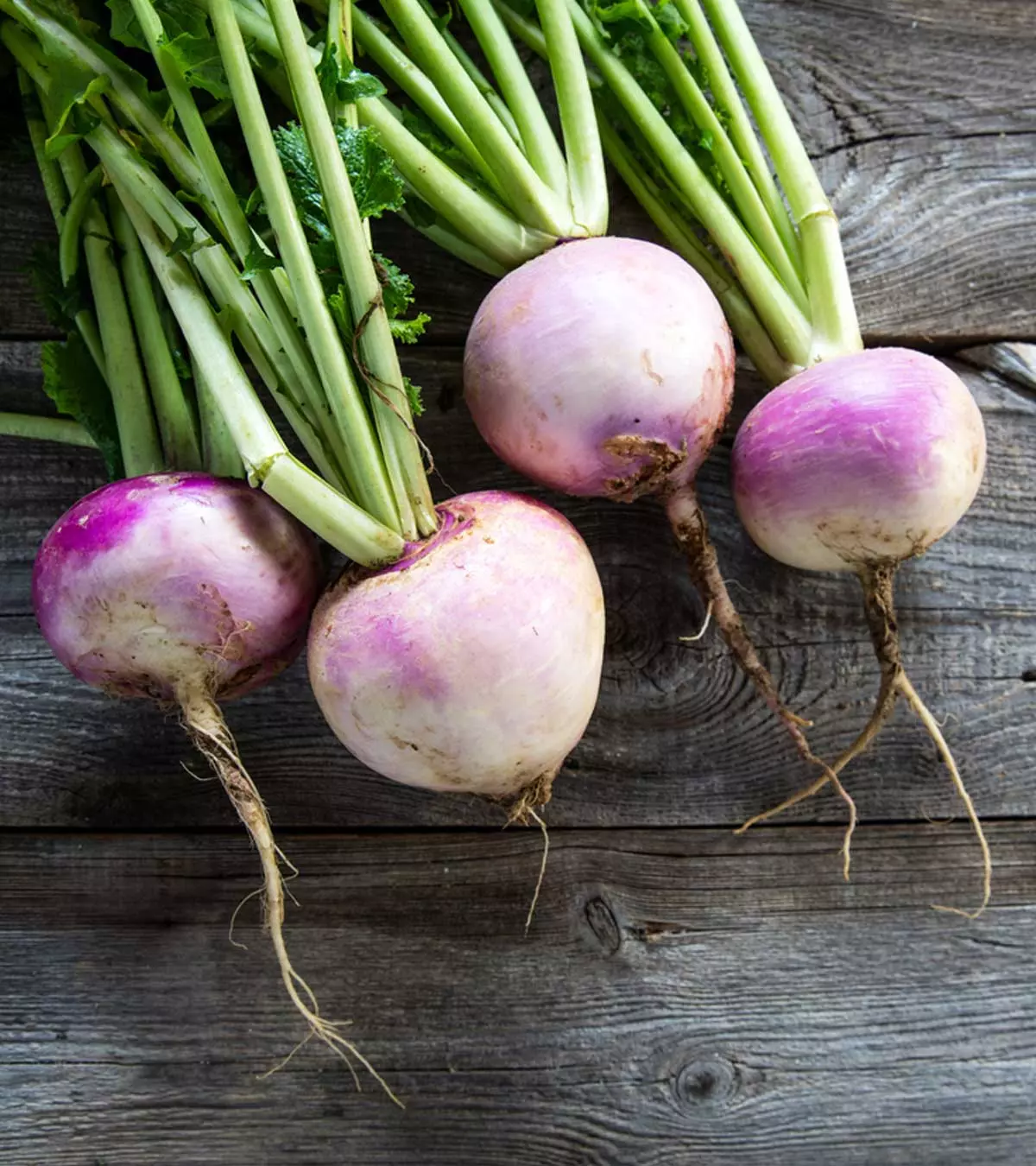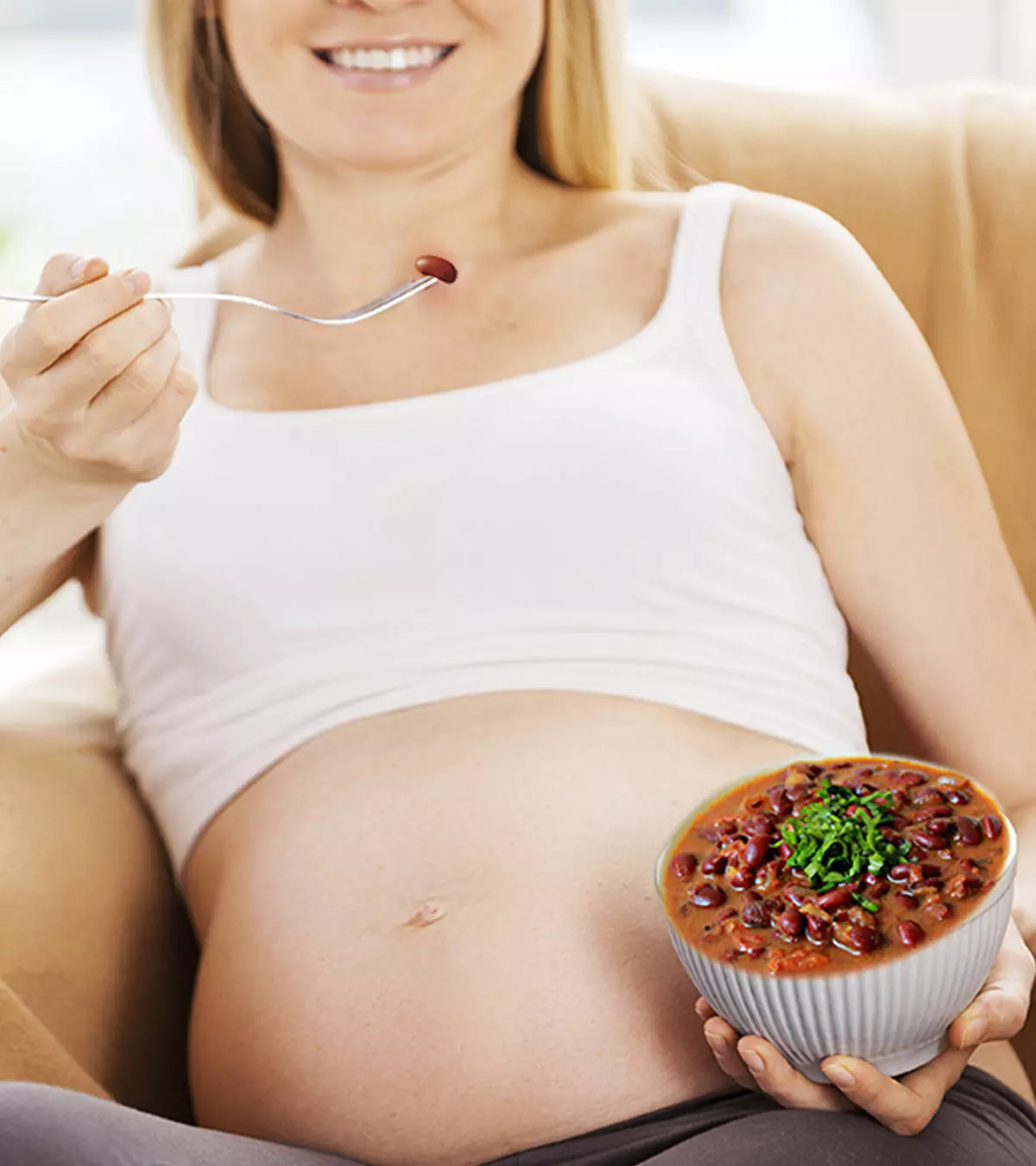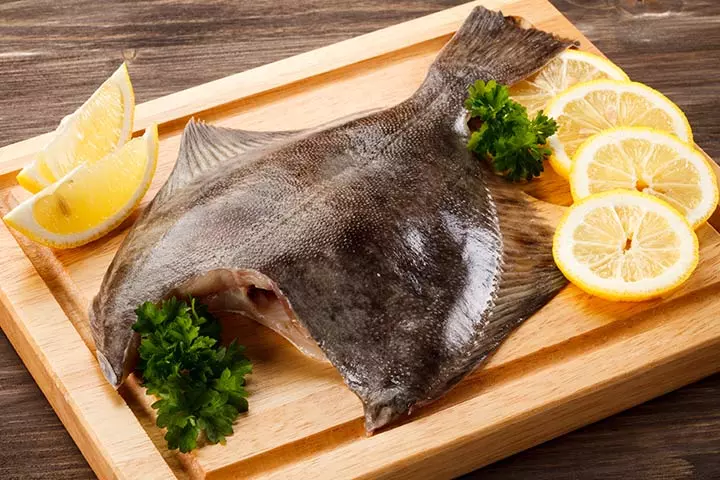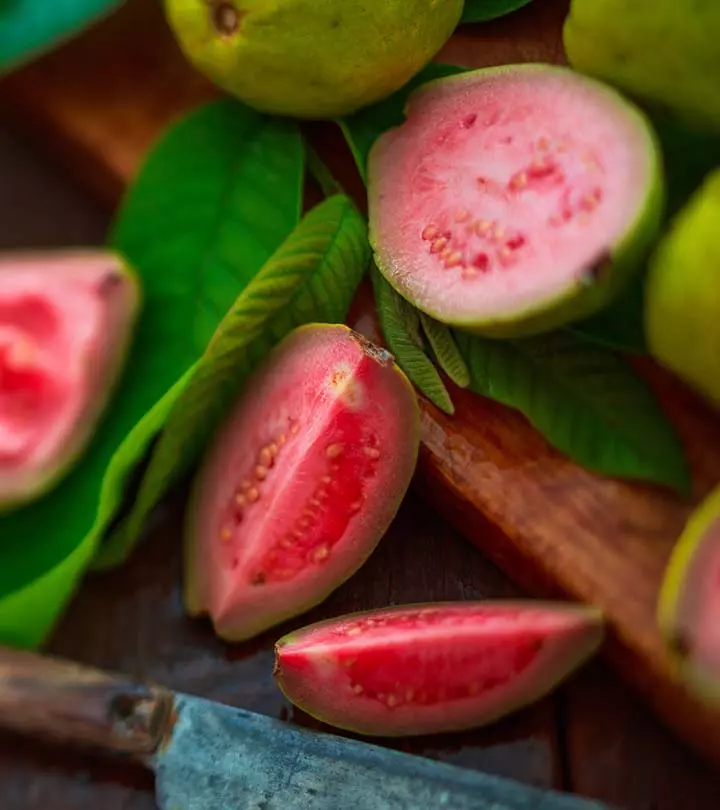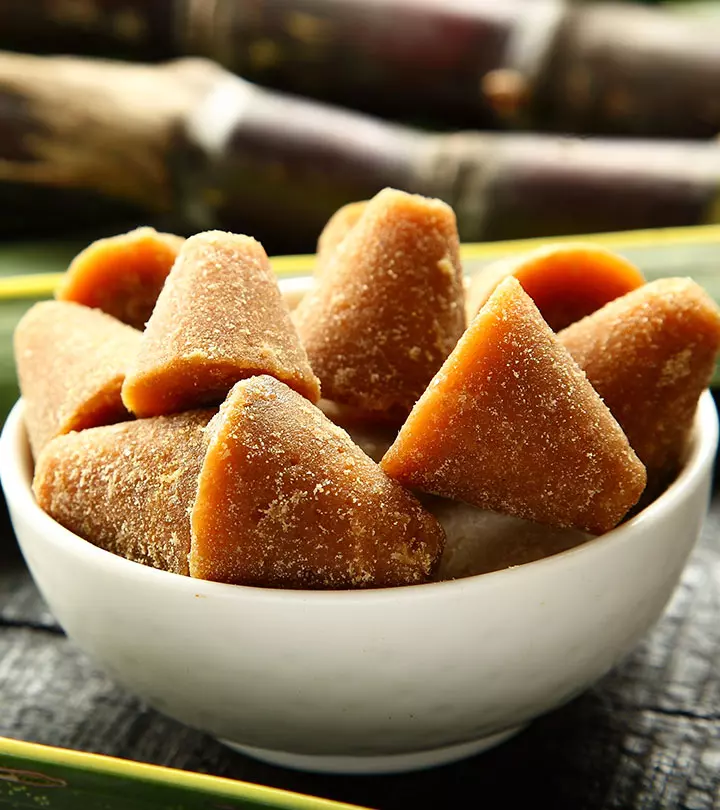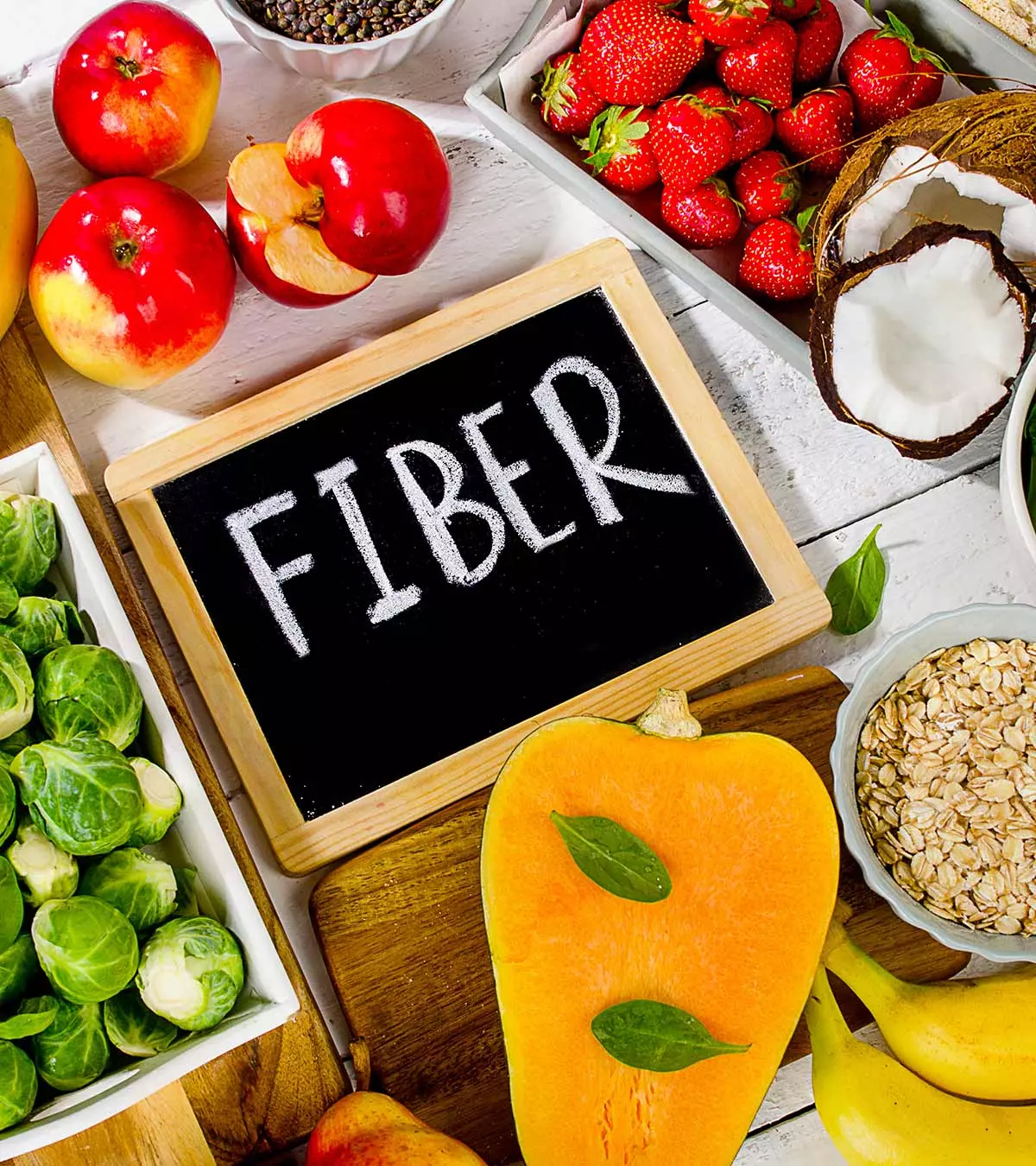
Image: ShutterStock
Consuming fiber-rich foods during pregnancy has several health benefits. For example, it helps you stay satisfied for longer without consuming extra calories, regulate blood sugar, relieve constipation, and lower the risk of cardiovascular diseases.
Pregnant women can easily meet their daily fiber requirements by eating a balanced diet consisting of fruits, vegetables, cereals, and beans. If you cannot get enough fiber from your diet, consult a doctor for fiber supplements. However, even though fiber is good for you, consuming it in excess may lead to side effects such as abdominal pain or bloating.
Read this post for more information on the benefits of fiber during pregnancy, its side effects, some foods rich in fiber, and tips to increase your daily fiber intake.
Key Pointers
- Consuming fiber reduces the risk of cardiovascular disease, gestational diabetes, and preeclampsia while preventing weight gain, regulating blood sugar levels, and preventing constipation.
- For pregnant women, a daily fiber intake of 28g is advised.
- If necessary, fiber supplements are acceptable, but only after seeing a physician.
- Abdominal pain or bloating may occur as a result of excessive fiber consumption.
- Almonds, bran cereal, beans, broccoli, carrots, chia seeds, flaxseeds, apples, avocados, and berries are a few foods high in fiber that you can eat when pregnant.
What Are The Types Of Fiber And Their Role In Pregnancy?
The fiber found in plant-based diets plays a key role in digestive health. While it is not digestible and does not provide a direct energy source, it can still help improve prenatal health in various ways. There are two types of fiber – soluble and insolubleiA substance that cannot be dissolved , both of which are very important during pregnancy.
Jesse Feder, a registered dietitian from North Miami Beach, Florida, says, “Having fiber during pregnancy is healthy, as this allows proper gut health for the mom and proper nutrient absorption for both mother and child. Fiber intake during pregnancy also reduces the risk of developing gestational diabetes and preeclampsiaiA sharp increase in blood pressure . I have had pregnant clients come to me for nutrition consults who were severely lacking in fiber in their diets. After they increased their fiber intake, they felt more energetic, had healthier bowel movements, and decreased blood sugars.”
- Soluble fiber dissolves in water, forming a gel-like substance during digestion. It also manages cholesterol levels, reduces high sugar levels and lowers the risk of heart problems.
- Insoluble fiber does not dissolve in water but makes its way through the digestive tract, and adds bulk to the stools (1).
What Are The Benefits Of Fiber During Pregnancy?
The benefits of fiber intake during pregnancy are as follows.
1. Controls pregnancy weight gain
A study based on data from Canadian Community Health Survey (CCHS)
highlighted that 32% of Canadian women (n=1,335,615) experienced excessive weight gain during pregnancy. Fiber-rich foods keep you full for longer, preventing excess calorie intake and facilitating a healthy weight gain during pregnancy (2). Also, studies at the US National Institute of Health show that people on high-fiber diets tend to eat 10% fewer calories (3).
2. Prevents constipation
You can prevent constipation, which is a common digestive complaint during early pregnancy (4). The fiber adds bulk to your stools, easing bowel movements, and thereby providing constipation relief.
Jennifer, a mother to five children and a full-time homemaker, shares her story about recovering from pelvic organ prolapse after childbirth. Talking of what helped her heal, she says, “Avoiding constipation at all costs by eating lots of fruits and vegetables, avoiding excess caffeine, drinking lots of fluids, and adding extra fiber to my diet in the form of oatmeal and flax (i).”
3. Regulates blood sugar levels
Getting enough fiber in your diet will slow down the food absorption, thereby preventing blood sugars levels from rising quickly (5).
4. Lowers the risk of cardiovascular diseases
Soluble fibers can lower bad cholesterol levels by binding to cholesterol-rich bile acids in the digestive tract. Fiber, therefore, reduces the risk of cardiovascular illnesses (6).
5. Reduces the risk of preeclampsia

Image: Shutterstock
The intake of dietary fiber will lower the risk of conditions such as high blood pressure and preeclampsia (7).
Studies have found that including vital dietary nutrients such as fiber, prebiotics, and probiotics might impart considerable health benefits.
 Research finds
Research findsHow Much Fiber Do You require During Pregnancy?
The recommended daily fiber intake for pregnant women is 28g (8).
Following the correct fiber intake guidelines during pregnancy is ideal to support good maternal and fetal health.
15 High Fiber Foods For Pregnancy
Fruits, vegetables, beans, cereals and whole grains are excellent sources of fiber and are usually recommended in diet charts for pregnant women (8). Listed below are the fiber-rich foods you should include in your pregnancy diet to meet your daily requirement.
| High fiber foods | Standard amount | Dietary fiber (g) | Ways to include | |
|---|---|---|---|---|
| 1. | Almonds | 1oz | 3.3 |
|
| 2. | Bran cereal | ½ cup | 8 |
|
| 3. | Beans | ½ cup | 9.5 (navy beans) 8.2 (kidney beans) 6-7 (pinto, Lima, chickpeas, and lentils) |
|
| 4. | Broccoli | ½ cup | 2.8 |
|
| 5. | Collard greens | ½ cup | 2.7 |
|
| 6. | Rye crackers | One wafer | 2.5 (depends on the brand) |
|
| 7. | Prunes | One bite-size | 3 |
|
| 8. | Pumpkin | ½ cup | 3.6 |
|
| 9. | Pears | One small fruit | 4.3 |
|
| 10. | Blackberries | ½ cup | 3.8 |
|
| 11. | Sauerkraut (pickled cabbage) | ½ cup | 3 |
|
| 12. | Whole grain spaghetti | ½ cup | 3.1 |
|
| 13. | Baked potato | One medium-sized | 3.8 |
|
| 14. | Bananas | One medium-sized | 3.1 |
|
| 15. | Oranges | One medium fruit | 3.1 |
|
 Did you know?
Did you know?Is It Okay To Take Fiber Supplements While Pregnant?
It is okay and recommended to take fiber supplements during pregnancy for relief from constipation
. PsylliumiThe seeds of a plant used as a mild laxative , Metamucil or Citrucel are some of the best fiber supplements you can consider, but with the advice of a doctor (9).
Are Fiber Gummies Safe During Pregnancy?
Fiber gummies act as laxativesiA chemical that encourages bowel movements , but there is no research supporting their use during pregnancy
. It is better to talk to your doctor if you are planning to take them.
Are Fiber Choice Tablets Safe During Pregnancy?
Fiber Choice tablets are chewable tablets containing inuliniAn oligosaccharide that occurs naturally and is indigestible and non-absorbable , a natural dietary fiber present in fruits and vegetables. However, there is no research about their safety during pregnancy. You should speak to your doctor before planning to take them.
What Will Happen On Overeating Fiber In Pregnancy?

Image: Shutterstock
More often than not, you may fall short of the recommended dosage of fiber in your diet. But there are chances that you may take too much fiber, especially when you increase the fiber intake quickly. That can lead to (1):
- Constipation
- Abdominal pain
- Bloating and flatulenceiRemoving gas from the digestive system through the back passage
- Temporary weight gain
- Diarrhea or loose stools
- Drop in blood sugar levels
- Blockages within the digestive tract
- Nutrients deficiencies if you are taking more than recommended amount for a prolonged period.
It is better to call your doctor if you have any of the above symptoms and also experience nauseaiUncomfortable stomach and a feeling of about to vomit and high fever.
 Quick tip
Quick tipTips To Increase Fiber Intake During Pregnancy
Feder suggests, “To increase your fiber intake during pregnancy, have a diet rich in a variety of fruits, vegetables, legumes, and whole grains. Among the recommended foods to eat during pregnancy, some high-fiber foods include apples, berries, broccoli, beans, avocado, and spinach. Additionally, you can switch to snacks that are higher in fiber, such as popcorn.”
“Oatmeal is also one of the highest fiber foods you can consume. A serving of oatmeal can contain anywhere from four to eight grams of fiber, which is close to a third of a woman’s daily fiber requirements.”
Here are some quick tips for increasing the fiber intake in your diet (10).
- Drink more water when you have fiber-rich foods. Fiber acts as a laxative but is efficient only in the presence of sufficient water.

Image: IStock
- Add fiber gradually, for your body needs time to adjust, Also, a quick increase in fiber will lead to gastrointestinal illnesses.
- Choose whole grain varieties of bread, cereals, pasta, and rice.
- Include extra vegetables in your curries, casseroles, and sauces, or take them as side dishes.
- Eat raw fruits and vegetables (as high-fiber snacks) between your meals.
- Munch a handful of nuts or cereals, or top them on salads and soups.
- Consult a registered dietitian for a personalized high-fiber diet.
 Quick fact
Quick factNext, we give you a few simple fiber-rich food recipes.
Fiber Rich Meal Ideas For Pregnant Women
1. High-fiber vegetable salad
You can enjoy this nutritious snack between meals. It is a mix of colorful vegetables, tossed with a zesty dressing to add an extraordinary flavor to it.
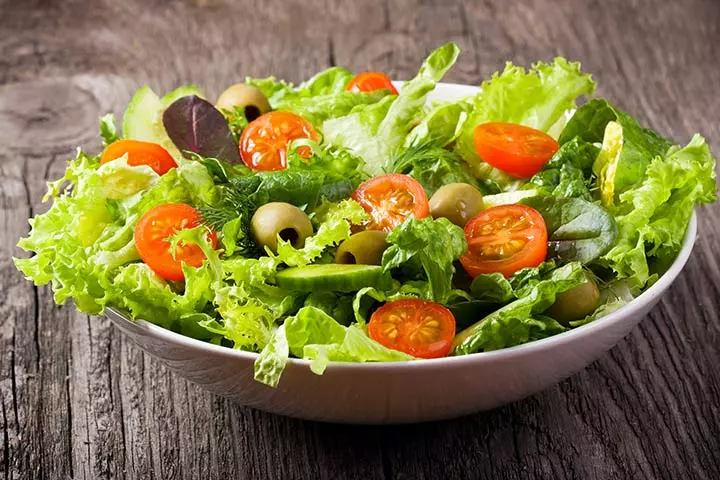
Image: Shutterstock
You will need:
- ¼ cup cabbage, shredded
- ¼ cup red cabbage, shredded
- ½ cup carrots, thinly sliced
- ½ cup cucumber, thinly sliced
- ¼ cup tomatoes, chopped
- ¼ cup green bell peppers, thinly sliced
- ¼ cup red bell peppers, thinly sliced
- ¼ cup yellow bell peppers, thinly sliced
- 2 tsp sunflower seeds, unsalted variety
For the dressing,
- 1 cup apple, grated along with skin
- 1tbsp lemon juice
- 1tbsp raisins, chopped (optional)
- 1/2tsp dried oregano
- 1tsp organic honey
- 1/8tsp salt
How to:
- Mix all the ingredients in a large bowl.
- Combine the dressing and mix well.
- Consume it fresh.
Preparation time:
15min
Serving: 4
2. Apple-cinnamon oats
A quick, fiber-packed meal that is ideal for your breakfast.
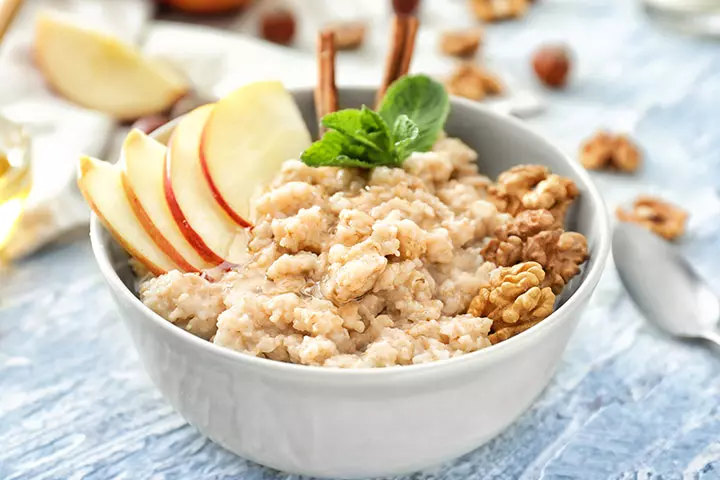
Image: Shutterstock
You will need:
- 1 cup milk (preferably non-fat)
- 2/3rd cup rolled oats
- ¼ tsp cinnamon
- A few apple slices
- Handful of walnuts
How to:
- Add milk to the rolled oats.
- Sprinkle cinnamon and mix well.
- Cover the bowl and put it in the refrigerator overnight.
- Next morning, add the sliced apples and chopped walnuts and consume.
Preparation time:
5min
Servings: 1
Frequently Asked Questions
1. What’s a good breakfast when pregnant?
A good breakfast for a pregnant woman must contain healthy carbohydrates, protein, calcium, fiber, iron, and folate. While the other nutrients are necessary for the growth of the fetus, consuming a good amount of fiber in your breakfast could help relieve constipation.
2. When will constipation stop in pregnancy?
Constipation is more likely to be present throughout the pregnancy. You may experience it severely during the third trimester. This discomfort might stop three months after the birth of a baby (11).
3. Is fiber good for the uterus?
“Fiber is good for the uterus because it helps remove toxins from the body as it absorbs many things along the digestive tract. This helps keep a good balance of healthy bacteria in our bodies. Fiber can also remove excess estrogeniA steroid hormone vital for female reproduction that may form, which can prevent fibroidsiNon-cancerous tumors that develop in or around the uterus from developing in the uterus,” opines Feder.
4. How can I tell if I’m getting enough fiber?
A good indicator of adequate fiber intake is regular bowel movements and a feeling of fullness after meals. The general recommendation for pregnant women is about 25-30 grams of fiber per day, depending on individual needs (8).
A fiber-rich diet has plenty of health benefits. It helps in maintaining bowel health, aids in blood sugar control, and reduces the chances of cardiovascular health and preeclampsia. By making small changes in your diet, you can ensure ample fiber intake during pregnancy. Your gynecologist or nutritionist may also prescribe some fiber supplements to help you meet your daily recommended fiber intake. Avoid using any OTC fiber supplements without your doctor’s consent. Also, avoid overconsumption of fiber as it may cause some gastrointestinal problems during pregnancy.
Infographic: Points To Consider When Increasing Pregnancy Fiber Intake
During pregnancy, including more fiber in your diet is not only essential for good digestive health but also satiates your hunger for a longer period. However, avoid overconsumption as it can affect adversely. Look at the infographic below to take note of a few things you must follow when increasing your fiber intake during pregnancy. Illustration: Momjunction Design Team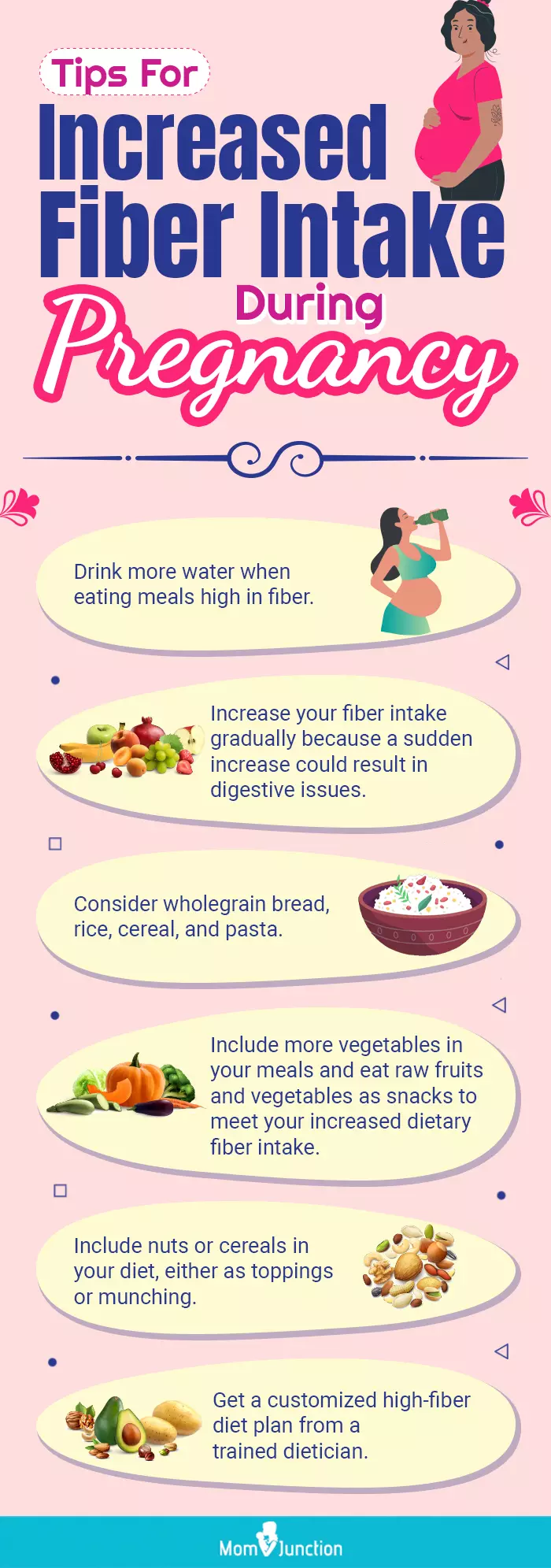
Illustration: High-Fiber Foods To Keep Constipation At Bay In Pregnancy

Image: Dall·E/MomJunction Design Team
Personal Experience: Source
MomJunction articles include first-hand experiences to provide you with better insights through real-life narratives. Here are the sources of personal accounts referenced in this article.
i. My pelvic organ prolapse story of healing and moving forward.https://bookishfamily.blogspot.com/2019/02/healing-pelvic-organ-prolapse-rectocele.html
References
- Nutrition and Health Info Sheet: Fiber.
https://nutrition.ucdavis.edu/sites/g/files/dgvnsk426/files/content/infosheets/factsheets/fact-pro-fiber.pdf - Fiber.
https://lpi.oregonstate.edu/mic/other-nutrients/fiber - Rough Up Your Diet.
https://citeseerx.ist.psu.edu/viewdoc/download?doi=10.1.1.174.172&rep=rep1&type=pdf - Common Discomforts During Pregnancy.
https://www.chop.edu/conditions-diseases/common-discomforts-during-pregnancy - Gestational diabetes.
https://www.northwell.edu/sites/northwell.edu/files/2017-11/Gestational-Diabetes-Brochure_single-page__0.pdf - Fiber: the Basics.
https://med.umich.edu/hits-redirect.html?url=https://www.uofmhealth.org/conditions-treatments/nutrition-services/food-and-nutrition-while-hospital/_pdf/hetm-2016/0816-roleoffiber.pdf - Chunfang Qiu et al.; (2008); Dietary fiber intake in early pregnancy and risk of subsequent preeclampsia.
https://pubmed.ncbi.nlm.nih.gov/18636070/ - Rachelle A. Pretorius and Debra J. Palmer; (2021); High-Fiber Diet during Pregnancy Characterized by More Fruit and Vegetable Consumption.
https://www.ncbi.nlm.nih.gov/pmc/articles/PMC7824257/ - Improving Your Health With Fiber.
https://health.clevelandclinic.org/fiber - High Fiber Diet.
https://www.rush.edu/sites/default/files/2020-09/high-fiber-diet.pdf - Pregnancy Constipation.
https://my.clevelandclinic.org/health/diseases/21895-pregnancy-constipation#:~:text=You’re%20most%20likely%20to - Kassem Makki et al.; (2018); The Impact of Dietary Fiber on Gut Microbiota in Host Health and Disease.
https://pubmed.ncbi.nlm.nih.gov/29902436/ - How much fiber is in whole grains versus refined grains/non whole grains?
https://ask.usda.gov/s/article/How-much-fiber-is-in-whole-grains-versus-refined-grains-non-whole-grains#:~:text=While%20fiber%20content%20differs%20among,to%203%20grams%20of%20fiber
Community Experiences
Join the conversation and become a part of our nurturing community! Share your stories, experiences, and insights to connect with fellow parents.
Read full bio of Sumaiya Patankar
- Jesse Feder did his Bachelor of Science in Applied Physiology and Kinesiology with a specialty in Exercises Physiology from the University of Florida. A certified personal trainer by the American College of Sports Medicine (ACSM-CPT) and a Certified Strength and Conditioning Specialist by the National Strength and Conditioning Association (NSCA-CSCS), he has seven years of experience in training people and providing nutrition guidance. Jesse holds a masters degree in Dietetics and Nutrition from Florida International University and is a Licensed and Registered Dietitian (LDN/RDN).
 Jesse Feder did his Bachelor of Science in Applied Physiology and Kinesiology with a specialty in Exercises Physiology from the University of Florida. A certified personal trainer by the American College of Sports Medicine (ACSM-CPT) and a Certified Strength and Conditioning Specialist by the National Strength and Conditioning Association (NSCA-CSCS), he has seven years of experience in training people and providing nutrition guidance. Jesse holds a masters degree in Dietetics and Nutrition from Florida International University and is a Licensed and Registered Dietitian (LDN/RDN).
Jesse Feder did his Bachelor of Science in Applied Physiology and Kinesiology with a specialty in Exercises Physiology from the University of Florida. A certified personal trainer by the American College of Sports Medicine (ACSM-CPT) and a Certified Strength and Conditioning Specialist by the National Strength and Conditioning Association (NSCA-CSCS), he has seven years of experience in training people and providing nutrition guidance. Jesse holds a masters degree in Dietetics and Nutrition from Florida International University and is a Licensed and Registered Dietitian (LDN/RDN).
Read full bio of Rebecca Malachi
Read full bio of Swati Patwal
Read full bio of Dr. Joyani Das









